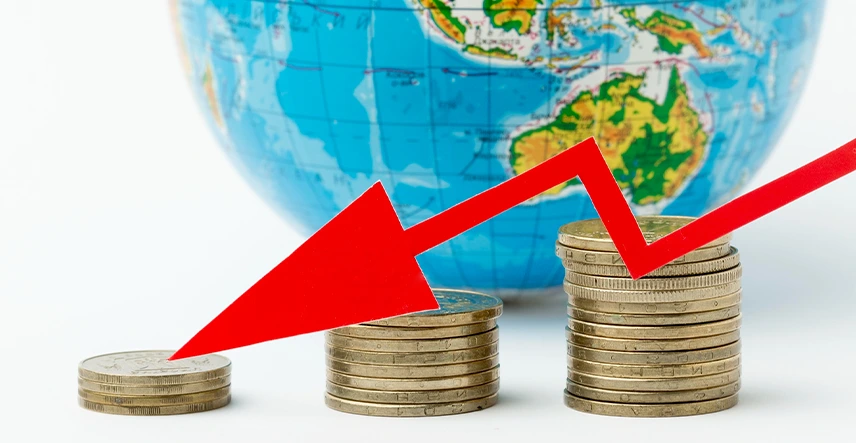As global inflation rates surge, concerns have arisen regarding its impact not only on domestic purchasing power but also on currency depreciation abroad. The immediate correlation between inflation differentials and short-term exchange rates remains ambiguous. Yet, persistent inflation surpassing rates in other countries is likely to drive depreciation of the affected country’s currency. Complications may escalate if governmental bodies intervene in an attempt to curb inflation. This article delves into the nuanced relationship between inflation and exchange rates amid economic disparities. To begin, let’s establish a clear understanding of both inflation and exchange rates.
Table of Contents
Defining Inflation
Inflation is the rate of increase in prices of goods and services over time.
- Each unit of currency gets fewer goods or services when the prices increase.
- As a result, inflation reflects the reduction in purchasing power per unit of a currency.
- In other words, it shows a loss of real value in the medium of exchange.
- According to the Reserve Bank of India (RBI), a 4% inflation target with a +/-2% tolerance band is reasonable for the five years between 2021–2025.
Defining Exchange Rate
The price of one currency against another currency is known as the exchange rate.
- There are generally two kinds of currency exchange rates; the fixed exchange rate and variable exchange rate.
- Fixed Exchange Rate: A system where a currency’s value is pegged or fixed to the value of another currency, or a basket of currencies, by a government or central bank.
- Variable Exchange Rate: A system where a currency’s value fluctuates freely based on market forces of supply and demand without direct intervention from authorities.
- The central banks of a country set fixed exchange rates, whereas market forces such as supply and demand determine floating exchange rates.
How Does Inflation Affect the Exchange Rates
Let us now see how inflation affects the forex market and the exchange rates. On numerous levels, the rate of inflation directly affects the exchange rate between two currencies. The following are some of the key ones.
Purchasing Power Parity
- Using the general price level (rather than the exchange rate), purchasing power parity aims to compare the various purchasing capacities of each nation. This allows for the identification of the country with the highest cost of living.
- Shifts in inflation and purchasing power parity impact the currency rate. If inflation is the same in both countries, the exchange rate remains unchanged.
- When inflation in one country is higher than the other, it affects the exchange rate.
- When this occurs, the currency that has a higher rate of inflation depreciates and loses value.
- On the forex market, the currency with the lowest inflation rate appreciates.
Interest Rates
- When inflation is too high, interest rates increase. The increase in consumer spending is a reason for higher inflation. This causes the central bank to raise interest rates to slow down economic activity. This results in the currency on forex depreciation (being less valuable).
- On the other hand, deflation or inadequate inflation results in falling interest rates, which raises the value of the currency on the foreign exchange market. However, the negative effects of inflation occur much more frequently than the good ones. While low inflation is far from a guarantee of an increase in the exchange rate, excessive inflation is likely to hurt it.
Investments
A nation’s currency loses value when inflation is high. This is because when goods get more expensive, investors do not invest in businesses. The opposite is also accurate. A country’s money flow usually increases, the currency’s purchasing power increases and the exchange rate grows stronger when inflation is significantly reduced.
Investors must note that a single inflation rate is meaningless. What central banks usually monitor is the changes in the inflation rate. Interest rates may increase if inflation keeps expanding. In contrast, the exchange rates may drop if the inflation rate is lowered. However, central banks always link the rate of a country’s economic growth to the degree of inflation. Monetary policy has a major impact on changes in interest rates. However, central banks often do not compromise economic growth, particularly during times of crisis.
You should also know that the nature of inflation’s effect on the currency rate is theoretical. In fact, the exchange rate is determined by a wide range of other factors.
Balance of Trade and Its Impact on Forex
- The difference between a country’s income from exports and its expenditure on imports is known as the balance of trade. The balance of trade can also be divided into balances of trades for products and balances of trades for services.
- When inflation raises the cost of goods and services in an economy, that country loses its competitiveness in the global market. This is because the products get costlier compared to other products of other countries. So, exporters lose market share to less expensive countries. As a result, the balance of trade changes, and the demand for the currency falls. This impacts the foreign exchange rate.
- Foreign goods and services are more attractive to consumers and businesses during periods of high inflation because they are less expensive. Imports will consequently rise. As a result, the currency depreciates as there is an increase in the supply of currency in the forex markets.
Conclusion
Exchange rates are interconnected with inflation. Inflation differentials between nations are unreliable for determining currency rates. Yet, prolonged inflation devalues the currency. Exchange rates are influenced by the Purchasing Power Parity Theory (PPP) and interest rate mechanisms. During rising inflation, a currency usually loses value. Contrarily, lower inflation may support a currency. Inflation also affects the balance of trade since it impacts the country’s competitiveness as well as foreign exchange demand for its currency. Many other factors also influence exchange rates. Hence, the relationship between inflation and exchange rate becomes quite complex.

